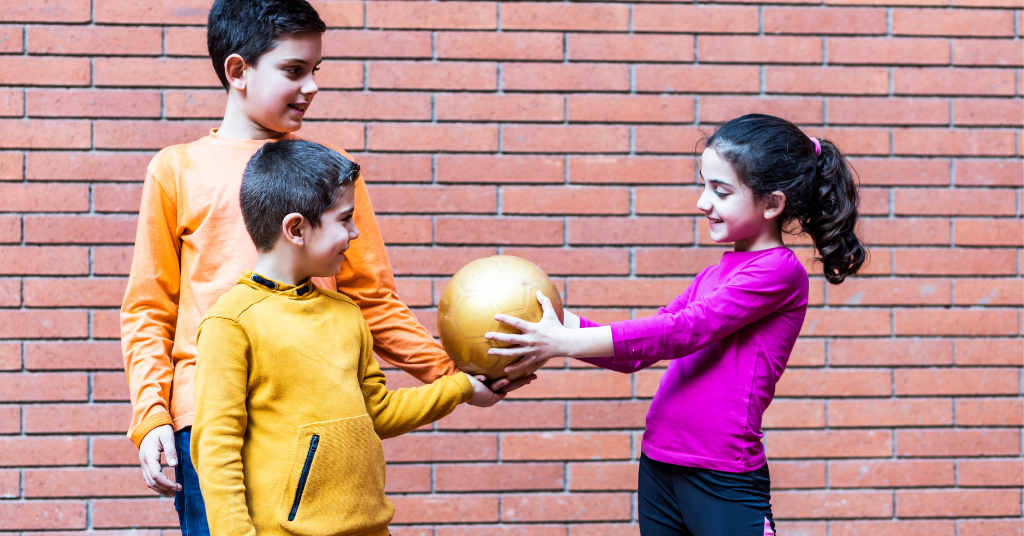Teaching your kids to be empathetic towards others is an important responsibility of a parent. Just like many other qualities, even kindness is a quality that children can learn over time and through practice. Well, there are many different ways that you can undertake to encourage your child to be kinder. For the initial phase, you can start by asking them to share books that encourage kindness. Before proceeding ahead, it is important to make your kids understand the meaning of empathy.

What is Empathy?
Empathy is defined as the ability to imagine how someone feels in a particular situation and respond. This is a slightly different skill to develop. Hence, being able to empathize with other people means that a child can do the following things.
a) Understands that he/she is a person.
b) Accepts that a person can have different thoughts, opinions, and feelings.
c) Can understand and comprehend the common feelings that the majority of people experience- happiness, anger, surprise, sadness, and disappointment.
d) Can look at a particular scenario and imagine how they would feel at that moment.
Related Article: 10 Good Manners To Teach Your Kids
Hence, empathy is all about perspective-talking and compassion. The next question is how can parents make their children empathetic and compassionate? We have listed down some important strategies based on the popular research and wisdom of practitioners.
1. Empathize With Your Child
It is a known fact that children look up to their parents for learning new things. Moreover, children can learn empathy by watching and experiencing their parents’. When you empathize with your child they develop trust and get attached to you. Parents should make sure, while empathizing with your child it can take different forms, including catering to their physical and emotional needs, understanding their personalities, showing a genuine interest in their lives, and motivating them to develop an interest in activities that reflect an understanding of the kind of people they are. Lastly, you need to notice roadblocks that might act as hindrances in the way.
Practice This-
a) Understand Your Child
Talk to your child and ask them questions, For instance, what did you learn today that was interesting? How would you like to spend a day if you could do anything? Do you respect any particular friend? Why do you respect that person?
b) Engage in Self-Care
Take out some time from your hectic schedule and try to indulge your kids regularly in an activity- whether it’s going for a walk, painting, reading a book, or meditating- all these activities will help you in reducing the stress to a great extent.
2. Set High Ethical Expectations for Your Kids
If you want your child to value other’s perspectives and show compassion make sure you tell them that caring about others is as important as their own happiness.
Practice This-
a) Define Your Message Clearly
You can consider the daily messages you send to your children about the importance of compassion and caring. If your child has been practicing the art of compassion with diligence you will often hear them say “because they’re compassionate, they’re happy”.
b) The World Doesn’t Revolve Around Your Child
Practically sometimes parents need to put their children’s concern above their happiness, for instance, continuously insisting that children turn off the TV and help with the household chores, and be polite even when they are in a bad mood.

3. Provide Your Children with Opportunities to Practice Empathy
Learning empathy is like learning a new skill or language. It requires thorough practice and guidance. By analyzing and considering the perspectives of other people you can make empathy a natural reflex.
Practice This-
a) Make Time for Family Gatherings
If your family is going through a rough patch, hold regular family meetings and let your kid voice their opinion. Carefully listen to your child and value their views and opinions.
b) Encourage Your Kids to Develop Empathy for Others
Make it a regular habit to talk to your children about their classmates and other peers. Make them understand that when they’re in a state of conflict with their peers they should consider their peers’ perspectives.
c) Keep a Regular Check on Your Child’s Empathy Pattern
When you are with your child make a note of areas and see whether they are reflecting strong empathy or lack of empathy. Discuss the importance of empathy and make them understand why it is important and why lacking empathy can be harmful.
Related Article: 5 Unique Tips To Build Consistency In Your Kid
4. Motivate Your Children Develop Self-Control
It is often seen that when children don’t express empathy it’s not because they don’t have it. It’s because some feelings are blocking their empathy. Perhaps, the ability to care for others is often overwhelmed, for example, by anger, shame, and other negative emotions. Helping your child manage these negative emotions about others helps in releasing their “empathy”.
Practice This-
a) Identify Feelings
Let your kids learn about different feelings such as frustration, sadness, and anger, and give them space where they can easily talk to you about why they’re feeling this way.
b) Develop Effective Strategies for Resolving Conflicts
To make your child feel empathetic and compassionate, teach them how to resolve conflicts. You can teach this with an example where a child witnessed a conflict and that it turned out pretty bad, and you can teach them effective ways of handling such situations. Try to arrive at a mutual understanding.

Final Words
Therefore, developing empathy takes time and you need to be patient. In many different ways, empathy is a vital social skill that helps in developing a foundation for other social skills. It helps us to understand others’ perspectives and feelings, understand each others’ emotions, connect, show compassion and care. Lastly, empathy also allows us to make good and sensible social decisions, and develop lasting relationships.
At PiggyRide, we are constantly trying to make the parenting phase interesting and wholesome. You can follow us for more such tips and tricks to foster effective parenting.


Leave a Reply